外研版必修3 Module 4 Sandstorms in Asia Listening and Vocabulary课件(21张ppt)
文档属性
| 名称 | 外研版必修3 Module 4 Sandstorms in Asia Listening and Vocabulary课件(21张ppt) | 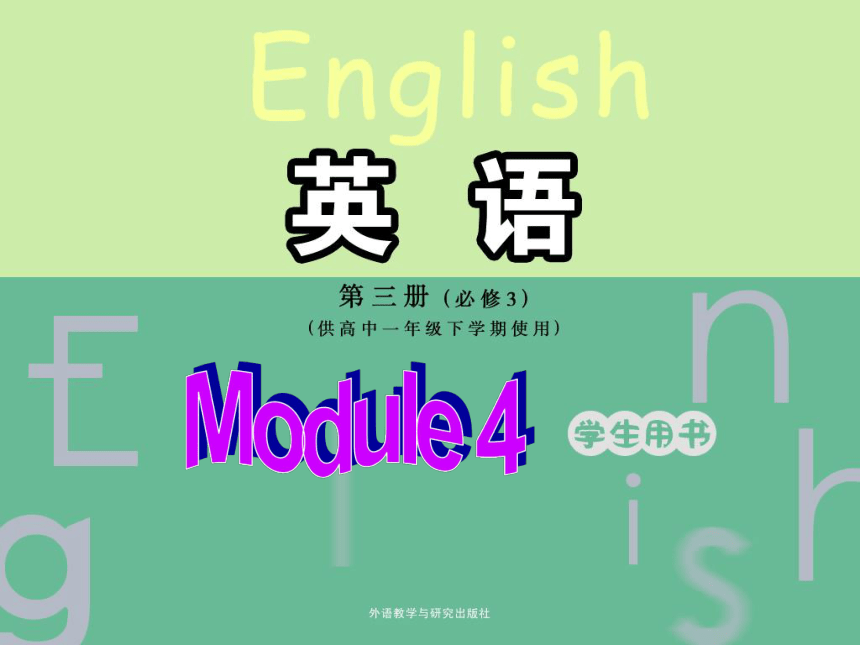 | |
| 格式 | zip | ||
| 文件大小 | 1.5MB | ||
| 资源类型 | 教案 | ||
| 版本资源 | 外研版 | ||
| 科目 | 英语 | ||
| 更新时间 | 2022-01-28 13:08:19 | ||
图片预览

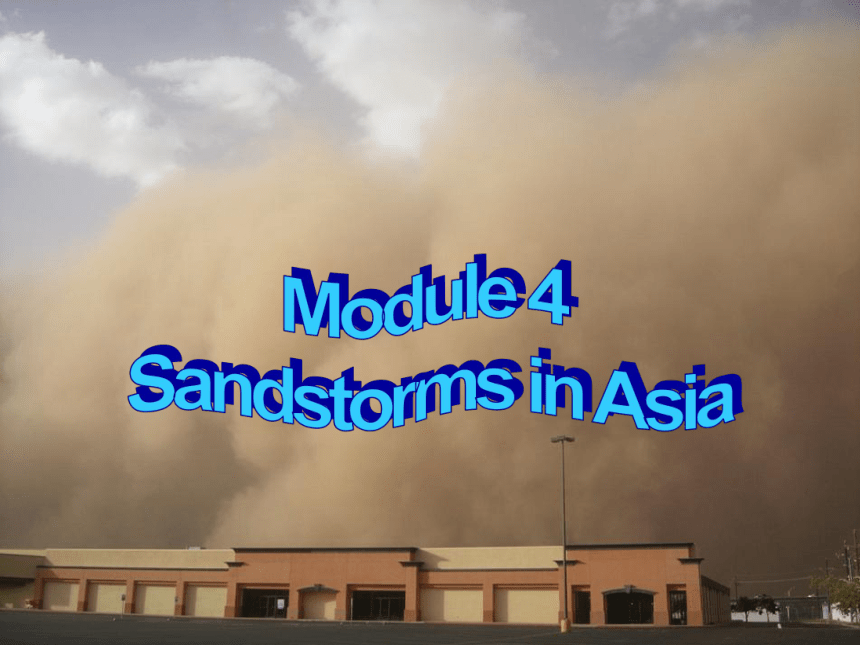

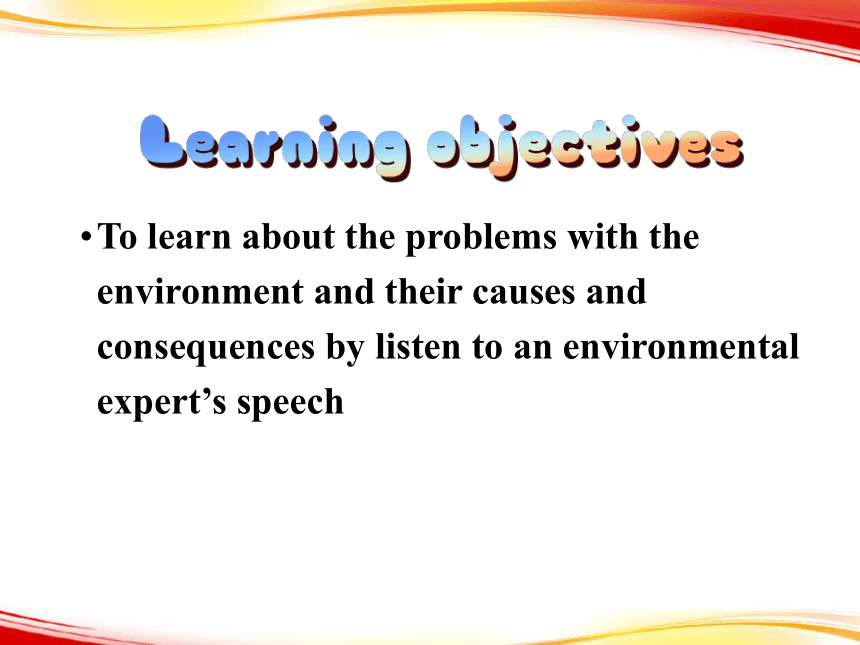
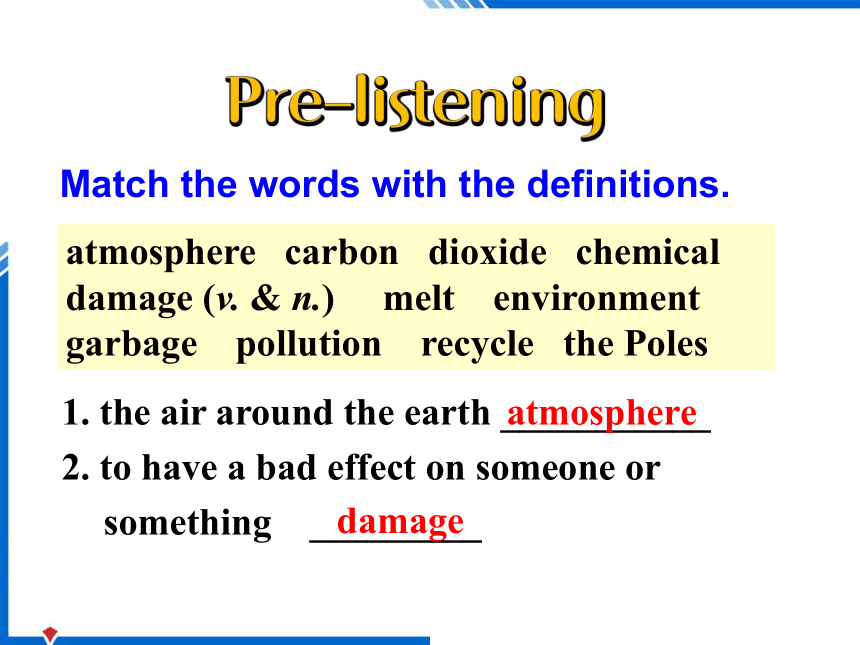

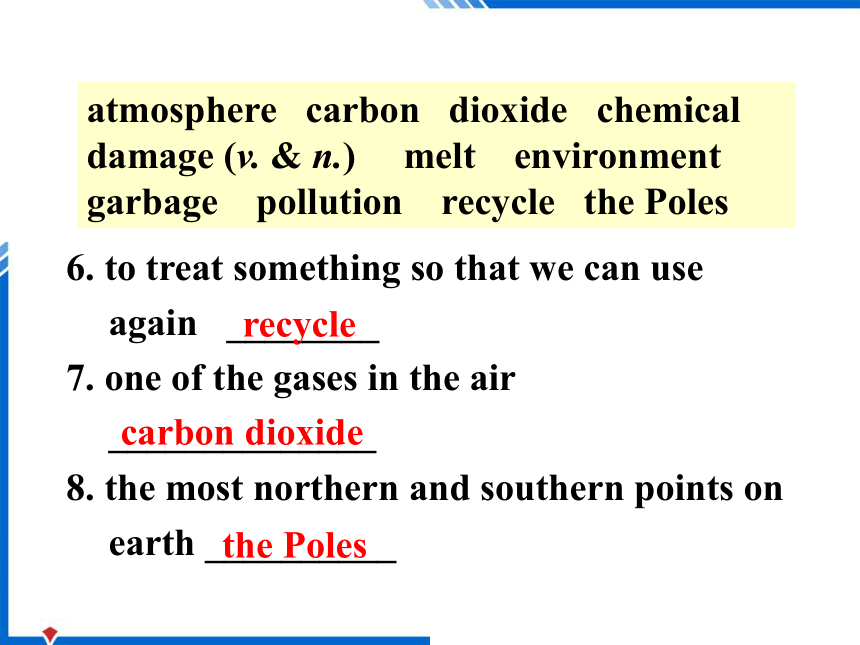
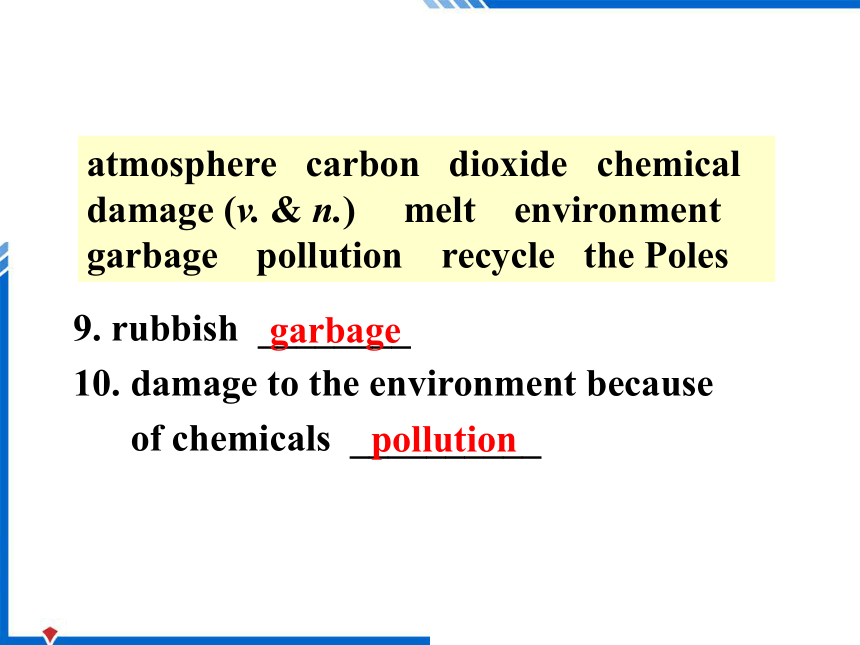
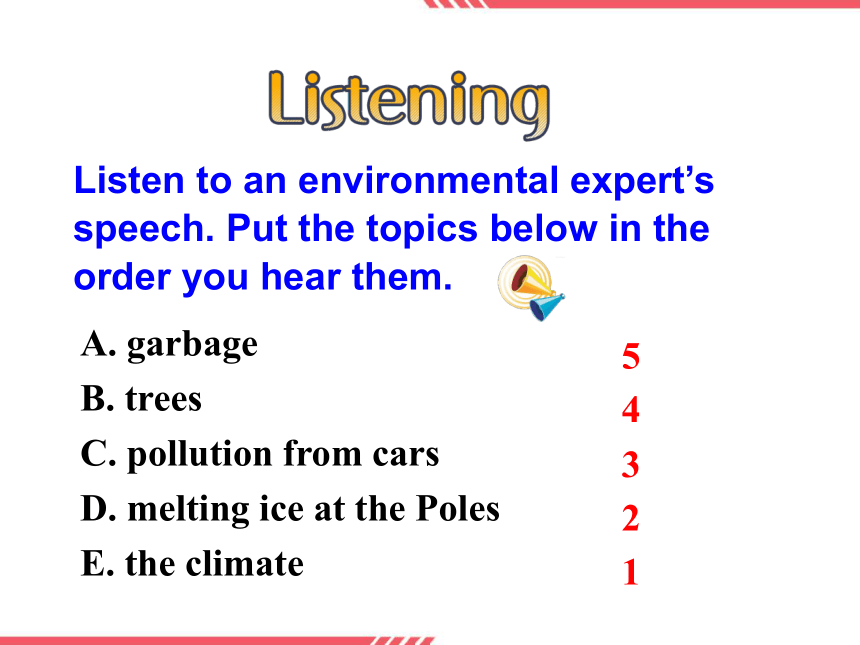
文档简介
(共21张PPT)
Module 4
Module 4
Sandstorms in Asia
To learn about the problems with the environment and their causes and consequences by listen to an environmental expert’s speech
Match the words with the definitions.
1. the air around the earth ___________
2. to have a bad effect on someone or something _________
atmosphere
damage
atmosphere carbon dioxide chemical
damage (v. & n.) melt environment
garbage pollution recycle the Poles
3. a substance used in chemistry
_________
4. the natural world – the land, air,
water, plants and animals ___________
5. to change from solid to liquid, e.g. ice
becomes water ______
chemical
environment
melt
atmosphere carbon dioxide chemical
damage (v. & n.) melt environment
garbage pollution recycle the Poles
6. to treat something so that we can use again ________
7. one of the gases in the air ______________
8. the most northern and southern points on earth __________
recycle
carbon dioxide
the Poles
atmosphere carbon dioxide chemical
damage (v. & n.) melt environment
garbage pollution recycle the Poles
9. rubbish ________
10. damage to the environment because
of chemicals __________
garbage
pollution
atmosphere carbon dioxide chemical
damage (v. & n.) melt environment
garbage pollution recycle the Poles
Listen to an environmental expert’s speech. Put the topics below in the order you hear them.
A. garbage
B. trees
C. pollution from cars
D. melting ice at the Poles
E. the climate
5
1
2
3
4
Check the meaning of the words.
coastal concerned evidence major urgent
concerned adj. 关心的
be concerned about /over /for
关心, 挂念
as (so) far as … is concerned
就……来说, 就……而言
Now listen again and answer the questions:
1. What is the most urgent problem of all
2. What examples of coastal cities does David give
The climate.
New York and Shanghai.
3. Why is the climate getting warmer
4. What is described as a major problem
Because pollution is stopping the sun’s heat leaving the atmosphere.
Carbon dioxide from cars.
5. What happens when we cut down a lot of trees
6. How does the interviewer feel about the situation
There is less oxygen and more carbon dioxide in the atmosphere.
Optimistic.
1. As a result, the ice at _________ is beginning to melt.
2. The sea may rise and cities on the coast may ______________________.
3. Too much carbon dioxide pollutes the ___________.
Listen again. Complete these sentences.
the Poles
disappear (under water)
atmosphere
4. Trees take in _____________ and give out ________.
5. We _______ garbage and pollute the atmosphere.
6. Instead, we should _______ the garbage.
carbon dioxide
oxygen
burn
recycle
Note:
1) Fish take in oxygen through their gills (鳃).
2) Don't trust that fellow. He will take you in if he gets the chance.
3) The kind old lady offered to take in the poor homeless stranger.
take in
吸收
欺骗
留宿, 收留
4. The lesson was too difficult for the class to take in.
5. The article takes in all aspects of the problem.
理解, 领会
包括, 包含
【即学即练】翻译下面句子。
1) We were completely taken in by his story.
我们完全被他的谎言欺骗了。
2) Our hotel is full. We can't take in any
more guests.
我们的旅馆已经客满,不能再接待客
人了。
3) This book is so difficult that I can't take in what the author means.
这本书很难,我无法理解作者的意思。
4) I usually drive to the countryside and take in the fresh air.
我经常开车去乡村吸收新鲜空气。
Talk about what we can do to improve our environment. Then give a report next time.
Module 4
Module 4
Sandstorms in Asia
To learn about the problems with the environment and their causes and consequences by listen to an environmental expert’s speech
Match the words with the definitions.
1. the air around the earth ___________
2. to have a bad effect on someone or something _________
atmosphere
damage
atmosphere carbon dioxide chemical
damage (v. & n.) melt environment
garbage pollution recycle the Poles
3. a substance used in chemistry
_________
4. the natural world – the land, air,
water, plants and animals ___________
5. to change from solid to liquid, e.g. ice
becomes water ______
chemical
environment
melt
atmosphere carbon dioxide chemical
damage (v. & n.) melt environment
garbage pollution recycle the Poles
6. to treat something so that we can use again ________
7. one of the gases in the air ______________
8. the most northern and southern points on earth __________
recycle
carbon dioxide
the Poles
atmosphere carbon dioxide chemical
damage (v. & n.) melt environment
garbage pollution recycle the Poles
9. rubbish ________
10. damage to the environment because
of chemicals __________
garbage
pollution
atmosphere carbon dioxide chemical
damage (v. & n.) melt environment
garbage pollution recycle the Poles
Listen to an environmental expert’s speech. Put the topics below in the order you hear them.
A. garbage
B. trees
C. pollution from cars
D. melting ice at the Poles
E. the climate
5
1
2
3
4
Check the meaning of the words.
coastal concerned evidence major urgent
concerned adj. 关心的
be concerned about /over /for
关心, 挂念
as (so) far as … is concerned
就……来说, 就……而言
Now listen again and answer the questions:
1. What is the most urgent problem of all
2. What examples of coastal cities does David give
The climate.
New York and Shanghai.
3. Why is the climate getting warmer
4. What is described as a major problem
Because pollution is stopping the sun’s heat leaving the atmosphere.
Carbon dioxide from cars.
5. What happens when we cut down a lot of trees
6. How does the interviewer feel about the situation
There is less oxygen and more carbon dioxide in the atmosphere.
Optimistic.
1. As a result, the ice at _________ is beginning to melt.
2. The sea may rise and cities on the coast may ______________________.
3. Too much carbon dioxide pollutes the ___________.
Listen again. Complete these sentences.
the Poles
disappear (under water)
atmosphere
4. Trees take in _____________ and give out ________.
5. We _______ garbage and pollute the atmosphere.
6. Instead, we should _______ the garbage.
carbon dioxide
oxygen
burn
recycle
Note:
1) Fish take in oxygen through their gills (鳃).
2) Don't trust that fellow. He will take you in if he gets the chance.
3) The kind old lady offered to take in the poor homeless stranger.
take in
吸收
欺骗
留宿, 收留
4. The lesson was too difficult for the class to take in.
5. The article takes in all aspects of the problem.
理解, 领会
包括, 包含
【即学即练】翻译下面句子。
1) We were completely taken in by his story.
我们完全被他的谎言欺骗了。
2) Our hotel is full. We can't take in any
more guests.
我们的旅馆已经客满,不能再接待客
人了。
3) This book is so difficult that I can't take in what the author means.
这本书很难,我无法理解作者的意思。
4) I usually drive to the countryside and take in the fresh air.
我经常开车去乡村吸收新鲜空气。
Talk about what we can do to improve our environment. Then give a report next time.
